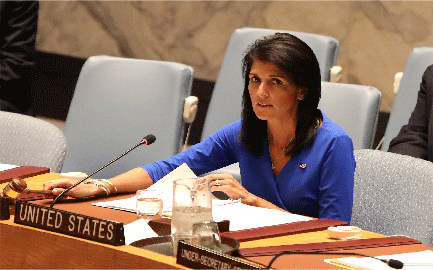International Responses to American Aggression in Syria

United States Ambassador to the United Nations, Nikki Haley, addresses the U.N. assembly about the recent American intervention in the Syrian civil war.
On the evening of Thursday, April 6, the United States Navy launched 59 Tomahawk missiles at a Syrian air base in response to a chemical weapons attack perpetrated by Syria’s President Bashar al-Assad. This action has triggered various responses from the international community, involving clashing interests and competing global powers. Given the series of events in the past years in the Middle East, international gridlock over Syria’s six-year conflict is at a breaking point.
Under former President Barack Obama, the United States engaged in bombing campaigns that targeted ISIS in Iraq and Syria. President Trump has continued this campaign, but the recent strikes are the first direct U.S. action against Assad’s military operations.
Despite the denunciation of Assad’s regime by the former Obama administration, the Trump administration has communicated different priorities concerning the desired outcome of this civil war. U.S. Ambassador to the United Nations Nikki Haley discussed the administration’s new stance to reporters days before the military strike.
“Our priority is no longer to sit and focus on getting Assad out,” Haley said.
A U.S. official further clarified her remarks to make it clear that the U.S. is not remissive of Assad, and iterated that Haley understands Assad as a “war criminal.”
Despite this explanation, it is clear that while the United States’ bombing action has escalated, the U.S. has also reduced its criticism of Assad. It does not appear as though recent military action and public political statements are consistent.
Russia has vocalized vehement opposition to the recent U.S. attack on Syria. President Vladimir Putin said the US attacks on Syria are “an aggression against a sovereign state in violation of the norms of international law, and under a trumped-up pretext at that.” These unanticipated attacks against Asaad clearly add more strain to the already tense relations between the U.S. and Russia.
Russia is Assad’s most outspoken supporter and has provided the military strength behind President Assad’s hold on the country. This is because of Russia’s significant military and strategic interests in the country, namely a Mediterranean naval base at Tartus. For Russia, Assad-controlled Syria is crucial for retaining strategic influence in the Middle East, as well as in the
international community as a whole.
Iran and China have both expressed opposition to the U.S. strike. As an ally of Russia, Iran has been a staunch supporter of Assad’s government.
China holds the position that foreign countries should not interfere in Syria’s internal affairs.
Despite opposition from these powerful parties, there has also been widespread backing, namely from Saudi Arabia, Jordan, Turkey, Australia, Israel, Japan, the United Kingdom, Spain and Italy.
Turkey has long supported the Syrian rebels.
“The destruction of Shayrat airbase marks an important step to ensure that chemical and conventional attacks against the civilian population do not go unpunished,” the Turkish presidential spokesperson said.
Saudi Arabia’s Foreign Ministry praised President Trump for his move, calling it a “courageous decision.”






